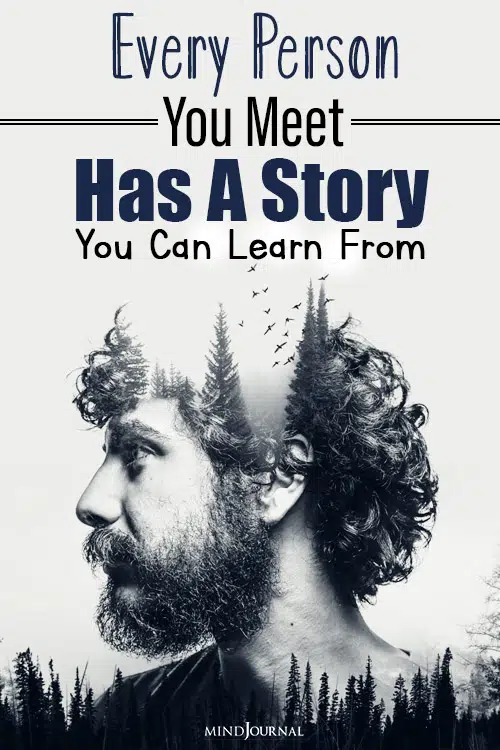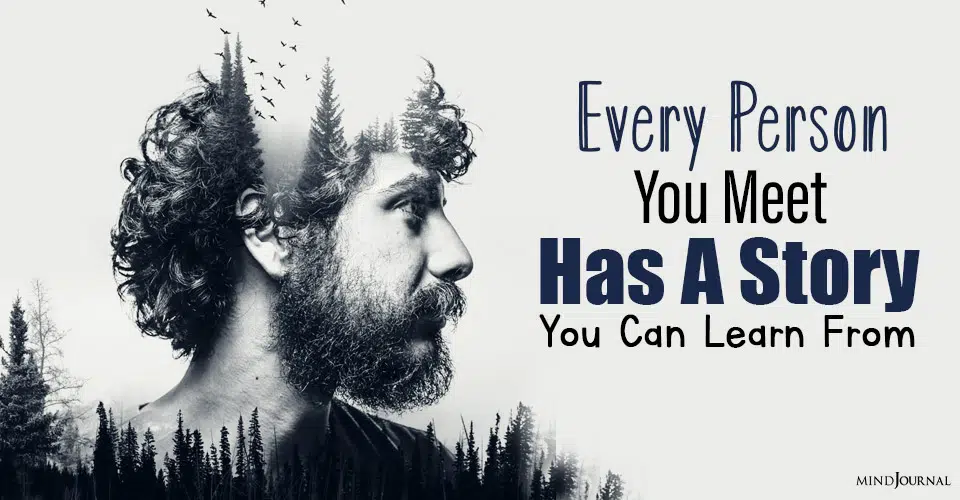We are very quick to judge others, based on how they look and behave on the outside, but seldom do we care to know what their story might be. Every person has a story, and trying to know it before judging them and dismissing them can help us be better people.
All I want is an open heart on an open road because our growth expands exponentially just outside our comfort zone. When we are pushed past our limits, when we skip over boundaries and are confronted with the unknown, we see things differently. We think more clearly. We learn.
And it’s not just teachers that teach us or the preachers who lead us. There are lessons all around – in stares with strangers, in lingering goodbyes, in hugs and sighs and forest scenes. As Jack Johnson sings, “The wisdom’s in the trees.”
The most exciting thing of all is that class is always in session and life lessons don’t need a time or date to get underway.
Related: How You Perceive Others Reveals Who You Are
I was reminded of this last week when a stranger changed my life. I don’t even know her name. I was staying with my cousin for a few nights, and his neighbor and her dog often sat on the back deck.
One evening, I watched her silently staring and glaring at the yard and her dog, sometimes breaking her peace to yell out for the barking to stop. She seemed harsh to me, and really, she seemed quite mean. I remember feeling bad for the dog. I remember wondering if he wished he lived on our side of the fence where a five-year-old girl would shower him with hugs and devour him with love.
My cousin came out and said hi. He asked her how she’s doing. Her answer shocked me, the words a heavy whisper, a drowning sentence anxiously searching for a life raft.
“My mother has cancer,” she said.
She just found out.
She’s flying to Europe to see her. Immediately, my heart sank as I thought of the pain she must be in, and it sank again when I realized I judged her poorly, harshly, wrong.
So often we project our own stories onto the lives of others.

That guy in traffic who cut us off isn’t a good dad rushing to pick up his daughter from school. He’s an asshole.
The waitress who was rude when we changed our order? We think she’s a bitch, but we don’t know her rent’s due and she doesn’t have it. We don’t know her boyfriend broke up with her last night and a part of her is dying inside and she’s not sure if she wants to quit or just give up on trying to live a little longer.
And on it goes. An annoying stranger. The loud lady on the train. Your boss. A sibling. A son.
Related: Characteristics Of A Truly Good Person
These people, all of them, have stories and secrets we’ll never know, so we project our best guess. We fill in the blanks of their lives. We write a quick story and believe it but we don’t give them a chance to read it, critique it, help us see that we create assumptions instead of connection when we choose our answer, and refuse to ask questions.
Emotions are just hints for us to go within, to dive deeper, to see what’s really there. They manifest in different ways. Sometimes hurt is rude and sometimes pain is mad. And, sometimes, in a small yard in a big city, sometimes heartbreak looks mean.
We never know what a person’s story might be.
Follow Jeremy Goldberg on Instagram @LongDistanceLoveBombs.
Written By Jeremy Goldberg Originally Appeared On Thought Catalog









Leave a Reply
You must be logged in to post a comment.